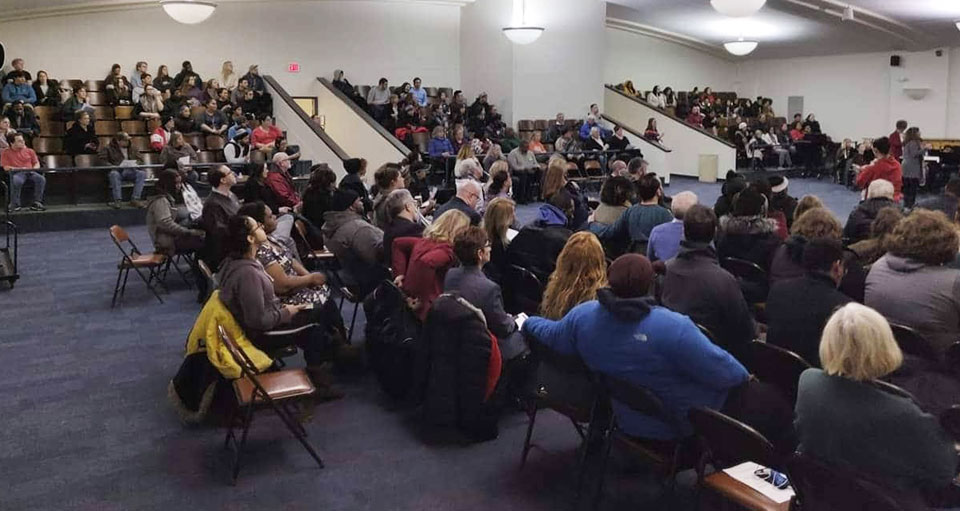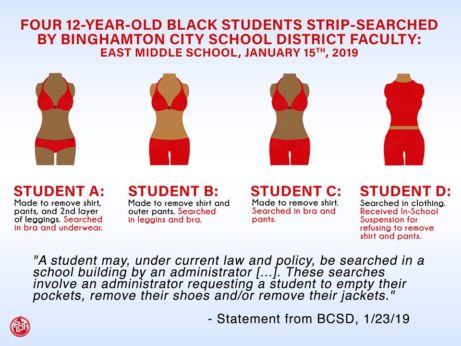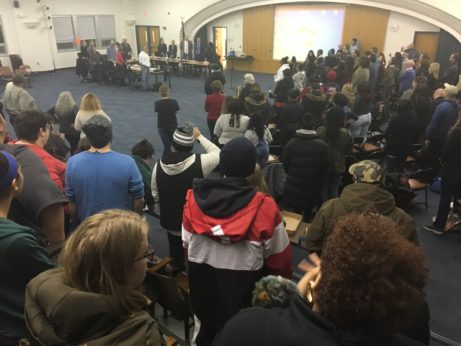
BINGHAMTON, N.Y.—On January 22, parents and community members from Binghamton, N.Y. held the floor for two hours at a school board meeting, presenting their demands in the wake of an incident where administrators at East Middle School strip searched four 12-year-old Black girls without the presence, consent, or even notification of their parents. The story that emerged at the meeting is a thing of unrivaled ugliness.
On January 15 (Dr. King’s birthday, as more than one speaker pointed out), during lunch period, Principal Tim Simonds noticed four girls engaged in behavior he qualified as “hyper and giddy.” On that basis, he had Assistant Principal Michelle Raleigh and the school nurse search the students for drugs. Three students were made to remove their shirts and were searched in only their bras. One of those students was also made to pull down her leggings, exposing her underwear. A fourth student refused to remove her clothing and received an in-school suspension as a result. During the searches, the nurse made humiliating comments about one girl’s skin and another’s breasts.
Parents were not notified—at least, not until their daughters told them after school that they had been held, questioned, and searched for over an hour. The mother of one of the girls described how she had requested an incident report on the search, but instead received a letter dated the next day, claiming that her daughter had consented voluntarily.

No drugs were found in the search, though that fact is irrelevant to the degrading treatment inflicted on the girls, as community members pointed out.
Progressive Leaders of Tomorrow (PLOT), a grassroots racial justice organization in Binghamton, formulated demands based on their discussions with the girls and their families. Those demands include an end to strip searches of children for any reason, the removal of the school leaders and staff involved, a public apology to students, parents, and the community, and alternate instruction for the students until the situation is resolved to their families’ satisfaction.
Other organizations adopted those demands as well, including the Broome-Tioga NAACP and TruthPharm, which advocates for humane, equitable, and research-based drug policy.
PLOT also issued a call to pack the school board meeting to present those demands. The community responded, some 200 strong, with a show of unity that overcame attempts by the school board to limit public comment and push the issue to the end of the meeting. Each time a board member attempted to invoke protocol or time limits—a move they used almost exclusively against women of color, including the mother of one of the girls—voices from the audience demanded, “Let her speak!”
Community members insisted on the board’s obligation to listen—not just to their grievances and demands, but to a sophisticated, collective analysis that placed the incident at East Middle School in its broader context of white supremacy, violence against women and girls, the War on Drugs, and the need for democracy and accountability.
Parents and community activists spoke to the ongoing struggle against racially discriminatory discipline in the Binghamton City School District. Current and former students expressed their solidarity and shared their own stories of discriminatory treatment, sexual harassment, and sexual assault in the district. Medical professionals and policy experts pointed out that trauma like this puts children at a higher risk of adverse health outcomes—including substance abuse. Educators, parents, and voters questioned the competence and judgment of the school administration and reminded the board that they are elected officials, serving at the behest of the people.

In response to that meeting, Binghamton City School District issued its first statement on the incident the next day, asserting the right of administrators to perform searches “that involve an administrator requesting the student to empty their pockets, remove their shoes and/or remove their jackets.” Section 7330 of the district’s policy handbook defines a strip search as “any search that requires a student to remove any or all of his/her clothing, except an outer coat or jacket” and holds that such searches “are intrusive in nature and are almost never justified.”
The district’s statement does not acknowledge that the procedure described by the girls constitutes a strip search, as defined by section 7330. As PLOT notes in a response posted to its Facebook page, “With the release of their statement, Binghamton City School District is surreptitiously accusing all four girls of lying about their trauma.”
The East Middle School community made itself heard, but the district’s response suggests that its priority is to avoid accountability. A follow-up rally is scheduled at East Middle School on Tuesday, January 29, at 3:15 PM.
If you can’t attend, but want to support this struggle you can:
— uplift the case by sharing updates on social media;
— write to BCSD Superintendent Tonia Thompson (ThompsonT@binghamtonschools.org), telling her implement the community’s demands; and — contribute to a fund established to support the girls in their healing and recovery from trauma.
Parents, students, educators, and the broader community are keeping up the fight to hold school officials accountable, end the barbaric practice of strip searching children, and build schools where the happiness of Black girls, and all kids, is welcomed and cultivated, not criminalized and punished.












Comments